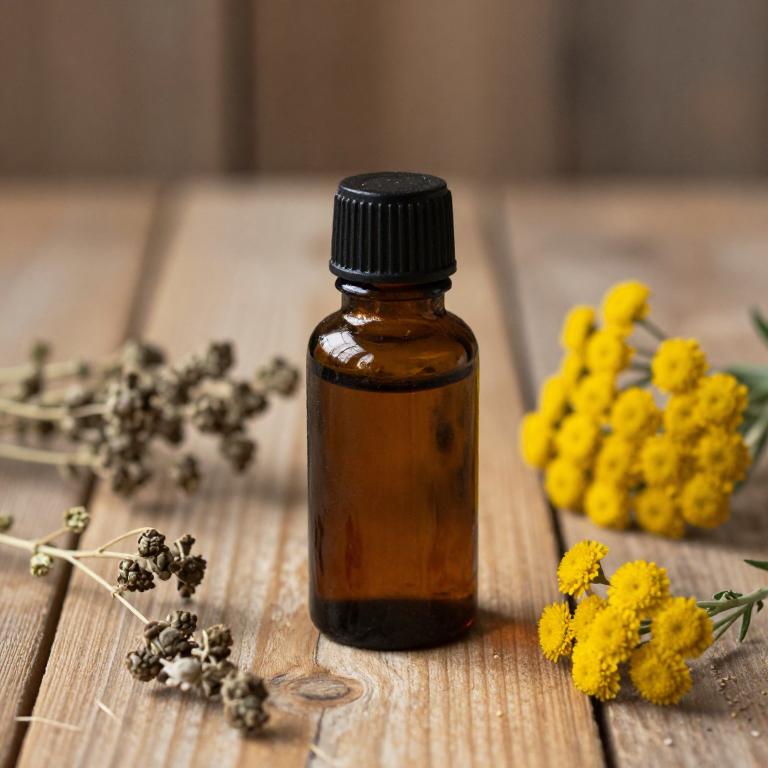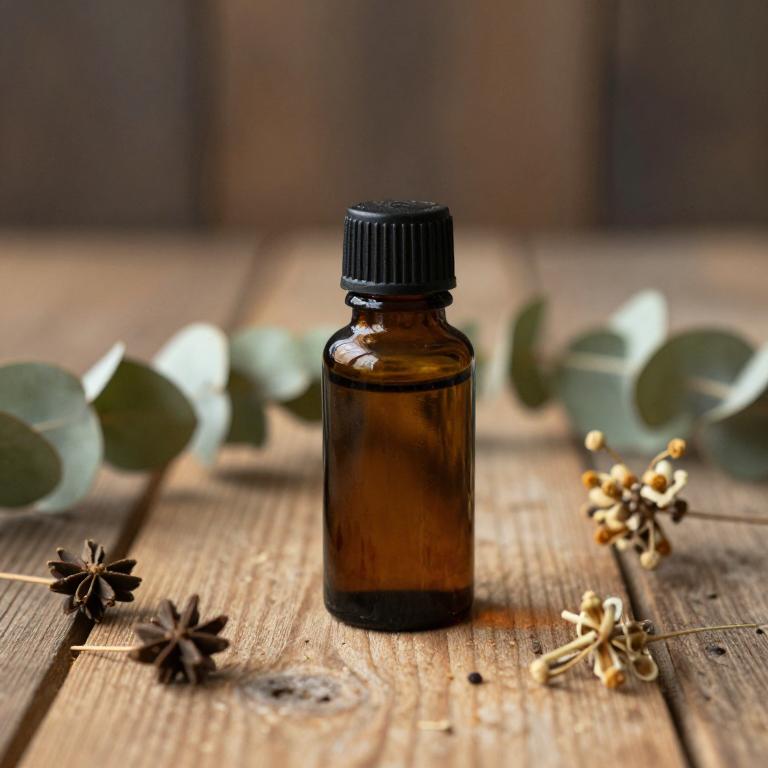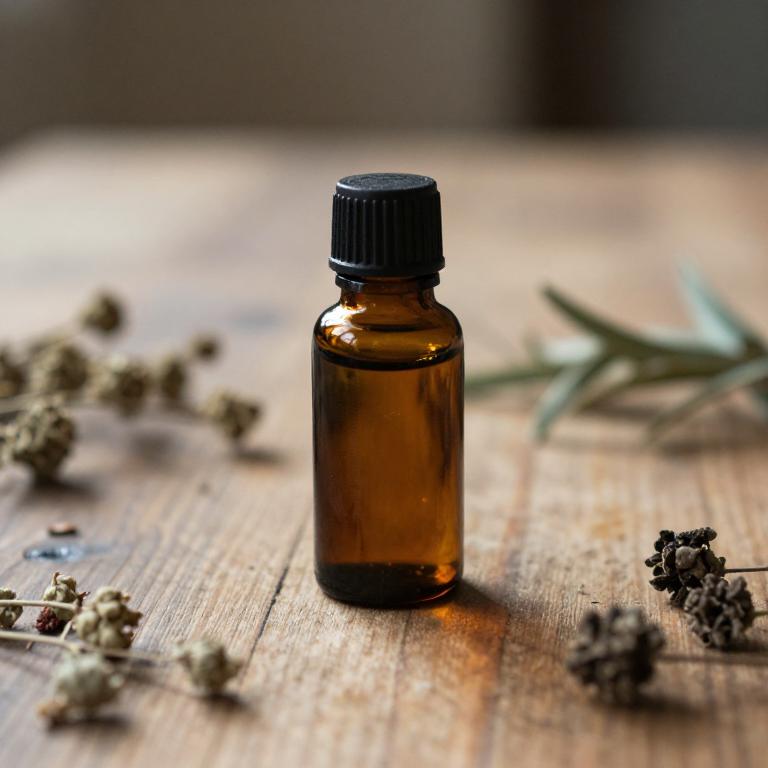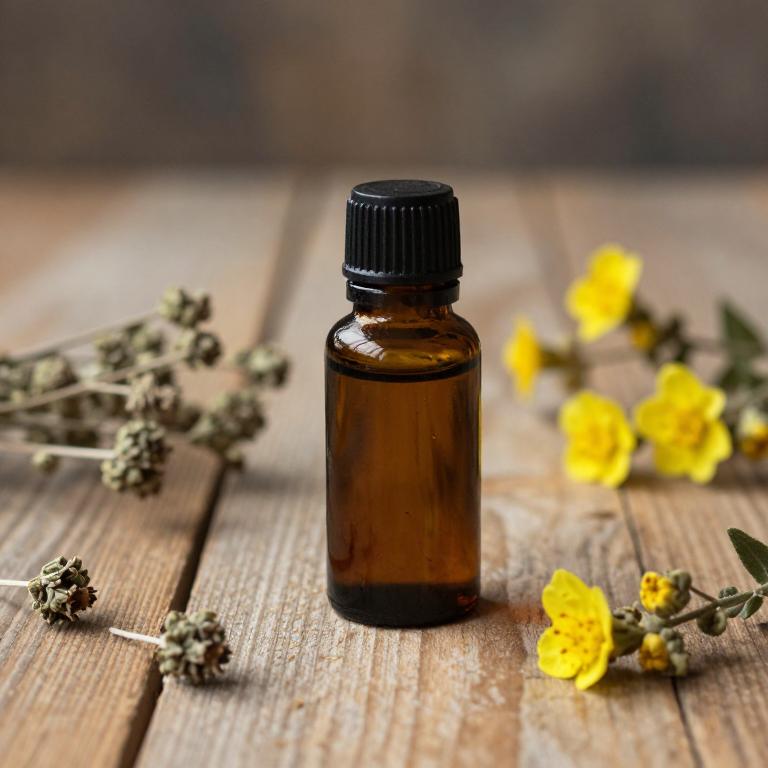10 Best Herbal Essential Oils For Insect Bites

Herbal essential oils such as lavender, peppermint, and tea tree oil are commonly used to provide relief from insect bites due to their natural anti-inflammatory and antiseptic properties.
These oils can help reduce swelling, itching, and the risk of infection when applied topically to the affected area. However, it is important to dilute them with a carrier oil like coconut or jojoba oil before applying to the skin to avoid irritation. Many people prefer these natural alternatives to synthetic insect repellents for their soothing and calming effects.
Always perform a patch test before using any new essential oil to ensure it is safe for your skin type.
Table of Contents
- 1. Melaleuca (Melaleuca alternifolia)
- 2. English lavender (Lavandula angustifolia)
- 3. Yarrow (Achillea millefolium)
- 4. Eucalyptus citriodora
- 5. Ceylon cinnamon (Cinnamomum zeylanicum)
- 6. Thyme (Thymus vulgaris)
- 7. Lemon grass (Cymbopogon citratus)
- 8. Rosemary (Rosmarinus officinalis)
- 9. Common teucrium (Teucrium marum)
- 10. Black pepper (Piper nigrum)
1. Melaleuca (Melaleuca alternifolia)

Melaleuca alternifolia, commonly known as tea tree oil, is a popular essential oil derived from the leaves of the Melaleuca alternifolia plant, native to Australia.
It is widely recognized for its antimicrobial, anti-inflammatory, and antiseptic properties, making it a valuable natural remedy for insect bites. When applied topically, tea tree oil can help reduce redness, swelling, and irritation caused by bites from mosquitoes, ticks, or other insects. However, it is essential to dilute the oil with a carrier oil before application to prevent skin irritation.
Due to its effectiveness and natural origins, melaleuca alternifolia essential oil is often recommended as a safe and alternative treatment for insect bite relief.
2. English lavender (Lavandula angustifolia)

Lavandula angustifolia, commonly known as English lavender, is a popular source of essential oils widely used for its calming and therapeutic properties.
The essential oil derived from this plant contains compounds such as linalool and linalyl acetate, which have natural anti-inflammatory and antiseptic qualities. When applied topically, lavender essential oil can help soothe the skin and reduce redness and irritation caused by insect bites. It is often diluted with a carrier oil before use to prevent skin irritation.
Due to its pleasant aroma and effectiveness, lavender essential oil is a favored remedy for relieving discomfort from insect bites and promoting relaxation.
3. Yarrow (Achillea millefolium)

Achillea millefolium, commonly known as yarrow, produces a herbal essential oil that has been traditionally used for its anti-inflammatory and antiseptic properties.
This essential oil is particularly valued for its ability to alleviate the symptoms of insect bites, such as swelling, redness, and itching. The active compounds in yarrow essential oil, including chamazulene and bisabolol, contribute to its soothing and calming effects on the skin. When applied topically, it can help reduce irritation and promote healing of the affected area.
However, it is important to dilute the essential oil properly before use to avoid skin irritation and ensure safe application.
4. Eucalyptus citriodora

Eucalyptus citriodora, also known as lemon eucalyptus, is a popular source of herbal essential oils used for its natural insect-repelling properties.
The essential oil contains high levels of citronellal, which is effective in repelling mosquitoes and other biting insects. When applied topically, it can provide a protective barrier against insect bites, making it a useful alternative to chemical-based repellents. However, it should be diluted with a carrier oil to avoid skin irritation.
This essential oil is also known for its refreshing aroma and may offer additional soothing effects on irritated skin from bites.
5. Ceylon cinnamon (Cinnamomum zeylanicum)

Cinnamomum zeylanicum, commonly known as cinnamon bark, produces a rich essential oil that has been traditionally used for its aromatic and therapeutic properties.
This essential oil contains compounds like cinnamaldehyde, which possess natural anti-inflammatory and antimicrobial qualities. When applied topically, it can help soothe the skin and reduce redness associated with insect bites. Its warming effect may also help alleviate itching and discomfort.
However, it is important to dilute the oil properly before applying it to the skin to avoid irritation.
6. Thyme (Thymus vulgaris)

Thymus vulgaris, commonly known as thyme, is a popular herb whose essential oil is widely used for its potent antiseptic and anti-inflammatory properties.
When applied topically, thyme essential oil can help alleviate the symptoms of insect bites by reducing swelling, redness, and itching. Its active compounds, such as thymol and carvacrol, possess strong antimicrobial effects that may prevent infection from the bite. However, it is important to dilute the essential oil with a carrier oil before applying it to the skin to avoid irritation.
Thyme essential oil can be a natural and effective remedy for soothing insect bites when used safely and appropriately.
7. Lemon grass (Cymbopogon citratus)

Cymbopogon citratus, commonly known as lemongrass, is a popular herb used in the production of essential oils that are beneficial for treating insect bites.
The essential oil derived from lemongrass contains compounds like citral and myrcene, which have natural anti-inflammatory and analgesic properties. When applied topically, it can help reduce swelling, redness, and itching caused by insect bites. It is often preferred over synthetic insect repellents due to its pleasant citrus aroma and natural origin.
However, it is important to dilute the essential oil properly before use to avoid skin irritation.
8. Rosemary (Rosmarinus officinalis)

Rosmarinus officinalis, commonly known as rosemary, produces a versatile essential oil that is widely used for its natural insect-repelling properties.
The oil contains compounds like camphor and pinene, which are known to deter a variety of insects, including mosquitoes and ticks. When applied topically, rosemary essential oil can help soothe the skin and reduce inflammation caused by insect bites. It is often diluted with a carrier oil to prevent skin irritation and ensure safe use.
This herbal essential oil is a popular alternative to synthetic insect repellents, offering a natural and aromatic solution for protecting against bites.
9. Common teucrium (Teucrium marum)

Teucrium marum, commonly known as germander, is a plant that contains essential oils with potential benefits for alleviating symptoms of insect bites.
The essential oils derived from Teucrium marum are rich in compounds such as thymol and carvacrol, which have antimicrobial and anti-inflammatory properties. These properties may help reduce redness, swelling, and itching associated with insect bites. When used topically, the essential oils can provide a soothing effect and promote faster healing of the affected area.
However, it is important to dilute the oils properly before application to avoid skin irritation.
10. Black pepper (Piper nigrum)

Piper nigrum, commonly known as black pepper, is a spice that also contains essential oils with potential benefits for treating insect bites.
The essential oils derived from black pepper contain compounds like piperine, which have anti-inflammatory and analgesic properties. These properties may help reduce swelling, pain, and itching associated with insect bites. When applied topically, the essential oil can provide a cooling sensation and offer relief from discomfort.
However, it is important to dilute the oil properly before use to avoid skin irritation, as undiluted essential oils can be too strong for direct application.